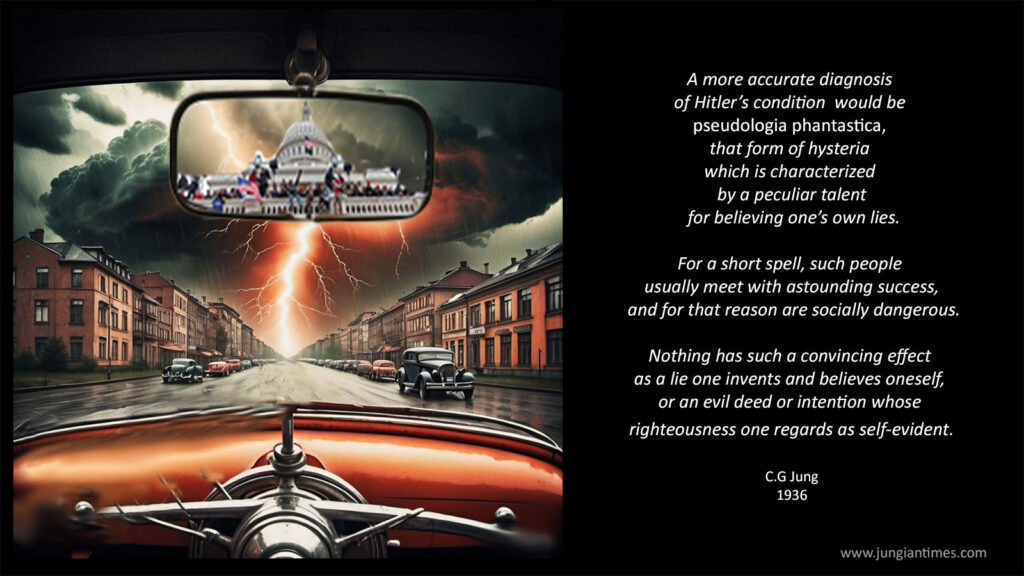
Jung on Hitler: A peculiar talent for believing one’s own lies
A more accurate diagnosis of Hitler’s condition would be pseudologia
phantastica, that form of hysteria which is characterized by a peculiar
talent for believing one’s own lies.
For a short spell, such people usually meet with astounding success, and for that reason are socially dangerous.Jung, Civilization in Transition, 1936
Nothing has such a convincing effect as a lie one invents and believes
oneself, or an evil deed or intention whose righteousness one regards as
self-evident.
All these pathological features—complete lack of insight into one’s own character, auto-erotic self-admiration and self-extenuation, denigration and terrorization of one’s fellow men (how contemptuously Hitler spoke of his own people!), projection of the shadow, lying, falsification of reality, determination to impress by fair means or foul, bluffing and double-crossing—all these were united in the man who was diagnosed clinically as an hysteric, and whom a strange fate chose to be the political, moral, and religious spokesman of Germany for twelve years.
Is this pure chance?
A more accurate diagnosis of Hitler’s condition would be pseudologia phantastica, that form of hysteria which is characterized by a peculiar talent for believing one’s own lies.
For a short spell, such people usually meet with astounding success, and for that reason are socially dangerous.
Nothing has such a convincing effect as a lie one invents and believes oneself, or an evil deed or intention whose righteousness one regards as self-evident.
At any rate they carry far more conviction than the good man and the good deed, or even than the wicked man and his purely wicked deed.
Hitler’s theatrical, obviously hysterical gestures struck all foreigners (with a few amazing exceptions) as purely ridiculous.
When I saw him with my own eyes, he suggested a psychic scarecrow (with a broomstick
for an outstretched arm) rather than a human being.
It is also difficult to understand how his ranting speeches, delivered in shrill, grating,
womanish tones, could have made such an impression….
A sorry lack of education, conceit that bordered on madness, a very mediocre intelligence combined with the hysteric’s cunning and the power fantasies of an adolescent, were written all over this demagogue’s face.
His gesticulations were all put on, devised by an hysterical mind intent only on making an impression.
He behaved in public like a man living in his own biography, in this case as the sombre,
daemonic “man of iron” of popular fiction, the ideal of an infantile public
whose knowledge of the world is derived from the deified heroes of trashy
films.
These personal observations led me to conclude at the time (1937)
that, when the final catastrophe came, it would be far greater and bloodier
than I had previously supposed.
For this theatrical hysteric and transparent impostor was not strutting about on a small stage, but was riding the armoured divisions of the Wehrmacht, with all the weight of German heavy industry behind him.
Encountering only slight and in any case ineffective opposition from within, the nation of eighty millions crowded into the circus to witness its own destruction.
Civilization in Transition
Collected Works Volume 10
Paragraphs 415 – 416
1937



